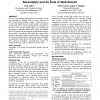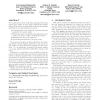504 search results - page 66 / 101 » Determining the user intent of web search engine queries |
CHI
2009
ACM
14 years 9 months ago
2009
ACM
The act of encountering information unexpectedly has long been identified as valuable, both as a joy in itself and as part of task-focused problem solving. There has been a concer...
WWW
2005
ACM
14 years 9 months ago
2005
ACM
We consider the problem of efficiently sampling Web search engine query results. In turn, using a small random sample instead of the full set of results leads to efficient approxi...
SIGIR
2012
ACM
11 years 11 months ago
2012
ACM
Many important search tasks require multiple search sessions to complete. Tasks such as travel planning, large purchases, or job searches can span hours, days, or even weeks. Inev...
ECAI
2008
Springer
13 years 10 months ago
2008
Springer
Keyword-based search engines, though hugely popular, are limited when trying to answer very specific queries. The processing of search results is performed by users, rather than th...
CIKM
2003
Springer
14 years 2 months ago
2003
Springer
Web pages (and resources, in general) can be characterized according to their geographical locality. For example, a web page with general information about wildflowers could be c...


